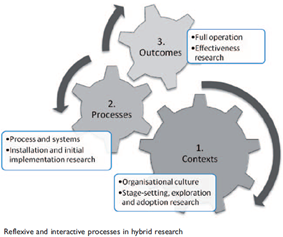Transforming silos to linked up services
Associated Research
Interagency collaboration and coordination is a critical transformation
needed to improve outcomes for children and families with complex needs. Effective interagency work remains a challenge that TeEACH is working with partners to address.
*The Kids Early Years Network (KEYs) provides a model for integration in primary health care focussing on prevention and early intervention for children and their families experiencing adversity. The model has been co-designed with community and service providers and developed based on best evidence of the enablers and components of effective integration. KEYS is being evaluated by TeEACH through establishment of a quality monitoring program and a stepped-wedge trial of a linked digital family care plan.
*The Hive is an organisation focused on bringing services together to help all children under 5 years old in the Mt Druitt postcode start school well. One strategy being trialled is embedding of Child and Family Health Nurses in early childhood education settings, to ensure that all children have access to developmental screening prior to school. Outcomes are being measured by TeEACH researchers.
Industry Partners and End-Users
The KEYs Network is led by Western Sydney Primary Health Network (WentWest), and consists of the NSW Department of Communities and Justice (DCJ), Sydney Children’s Hospitals Network (SCHN), Western Sydney Local Health District (WSLHD), Mt Druitt Police Area Command, Aboriginal Housing Office (AHO), and Department of Education (DoE). The HIVE is a collaboration with local government and NGO’s, local schools, and policy makers in the 2770 postcode area of Western Sydney.
Summary of the Impact
By the time children begin school in Australian, clear inequities in health and developmental outcomes are already evident. There is compelling global evidence that community-based system integration is needed to improve equity of service access and address the social determinants of health for children and their families. Whilst an increasing number of key international organisations, policies and professional groups have been advocating integrated systems approaches, few have articulated the practical approaches needed in implementation research to understand their delivery and effectiveness. Our work in system transformation with our partners and end-users is in the early stages with research results expected in 2022. We are confident that the co-design and participatory research will demonstrate positive outcomes for the children of western Sydney and their families. Already, individual family stories are showing the impact.
Aroha (name changed to protect identity) recently left an abusive relationship with her three young children. As a temporary visa holder, she was unable to access financial support, was homeless, and her children were not attending school. Once connected with the KEYS Network, Aroha was provided with a ‘navigator’ who worked with her to develop a family-centred plan and secured long-term housing for the family within 24 hours. Aroha’s children are now attending school and she is undertaking training that can lead to employment.
Approaches to Impact
There is a need to readjust research focus from exploring the singular impacts of complex social interventions such as sustained nurse home visiting or preschool, to thinking about interventions within complex social systems. Here interventions are thought of “as ‘events within systems’ which aim to disrupt the functioning of complex systems through changing relationships, displacing entrenched practices, and redistributing and transforming resources. It is a great challenge within the field to successfully evaluate such complex, whole systems in ways that generate useful evidence. Our research approach takes on this challenge by using implementation science methods to explore the ways that system integration can improve population outcomes in communities impacted by adversity.
Critical to the TeEACH research approach is co-design and use of participatory methods. TeEACH researchers are part of the team, rather than external evaluators. We engage with our partners from the earliest developmental stages of interventions and system transformation (often without funding), and work with partners to develop research strategies that are reflexive and interactive (see figure 9). We thus undertake complex research that explores contexts, and processes as well as the traditional focus on outcomes. This enhances the impact of the research as we can detail not just whether an intervention works, but also how, why and in what contexts, enhancing replication and potential for at-scale implementation and impact.

